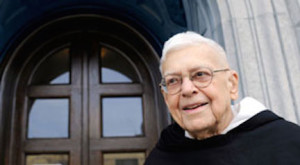‘Tis the season of hope. Not if you’ve been listening to the daily news, of course, but it is if you’ve been going to Mass and listening to the readings. We’ve been showered daily with hope-filled readings from the prophets — mostly Jeremiah, Isaiah, or Zechariah. There’s been a lot of the “wolf being a guest of the lamb” sort of thing; promises of “rich food and choice wines” (indeed, “juicy, rich food and pure, choice wines”); the deaf will hear and the blind will see; God will wipe away tears from every face.
With these, we’ve heard about making the lofty mountains low and filling in the valleys; promises about making the parched land exult and the steppe rejoice and bloom with abundant flowers; about turning the desert into marshland and the dry ground into springs of water; and a whole lot about people singing and shouting for joy, being glad and exulting. These are the readings we get every year at about this time. It’s Advent, and the Church thinks it is a good time to remind us that we’re to be a people “looking forward” to something – something very good.
A colleague reminded me recently, however, that all these very hopeful exclamations were made by men with good reason to view their times as not at all hopeful – whose historical situation was, to put it mildly, less than optimal. Jeremiah, Isaiah, and Zechariah all foresaw or experienced the utter defeat of Judah at the hands of her enemies and the exile of her people to an alien land.
All of them could see there was slavery and hardship in the future of a people who believed that nothing could defeat them since they were God’s “chosen,” and He had given them the “Promised Land.” And yet, there they were, on the verge of the abyss, looking over the edge, feeling the earth starting to give way beneath their feet. It would a long, hard fall. But in spite of it all, they were singing God’s praises and promising a bright future. Were they out of their minds? We don’t think so now, but it wouldn’t have been a bad bet at the time.
What is the ground of our hope? According to Thomas Aquinas, the motive or formal object of hope is God’s infinite power. We can hope because we believe that “for God all things are possible.” Fr. Benedict Ashley remarks in his wonderful book Living the Truth in Love (and repeats in his International Catholic University lectures based on the book) that “God’s mercy and promises would not be grounds for hope if God were powerless to fulfill his promises.”

Despair suggests Ashley, can be defined as “the deliberate acceptance of the thought that even God cannot save us from disaster.” Accepting this thought is to give in to what a friend of mine calls “the illusion of the powerlessness of God.” You have probably experienced the power of the illusion – the voices inside you that insist: God is not present in my suffering. He can’t “make straight” what is crooked. He can’t “right” what is “wrong.” He can’t fix what is broken. The forces of evil in the world and within us cannot be conquered.
Christian hope is the hope you have when there is no hope. In East Coker, T. S. Eliot bids his soul to:
. . .be still, and wait without hope
For hope would be hope for the wrong thing; wait without love
For love would be love of the wrong thing; there is yet faith
But the faith and the love and the hope are all in the waiting.
Wait without thought, for you are not ready for thought:
So the darkness shall be the light, and the stillness the dancing.
When the present is dark and the future darker, as it was for the prophets whose words of hope and joy we read in this season of Advent, it is at these times especially when we are called to walk by faith, not by sight – faith: the substance of things hoped for, the evidence of things unseen.
“It would be a great mistake, however,” Fr. Ashley wisely warns, “to judge that every person who seems without hope has committed this grievous sin of despair. A very common pathological mental condition is what is called depression, which can have many causes, genetic, hormonal, or the result of severe shocks such as the death of loved ones or the traumas of wartime combat. . . .When a person is suffering from mental pathology or simply grieving over tragic losses, or suffering under the heavy burdens of life and sickness, as Job was, their temptations to despair are spiritual trials not sins. One has only to read the Psalms to see how those who truly love God and hope in him, nevertheless complain to him, and find hope very hard.”
In these trials, we become purified of every other motive except confidence in God’s almighty power: “Trust in the LORD forever!” we read in Isaiah 26:4, “for the LORD is an eternal Rock.” The word “trust” here in the Septuagint is the Greek word for “hope.” He is a strong rock; He cannot be overcome. And in that, we find hope to go forward, even in the midst of great trials and tribulations and during times of darkness.
Do you not know
or have you not heard?
The LORD is the eternal God,
Creator of the ends of the earth.
He does not faint nor grow weary. . . .
He gives strength to the fainting;
for the weak he makes vigor abound.
Though young men faint and grow weary,
and youths stagger and fall,
They that hope in the LORD will renew their strength,
they will soar as with eagles’ wings;
They will run and not grow weary,
walk and not grow faint. (Is 40:28-31)















